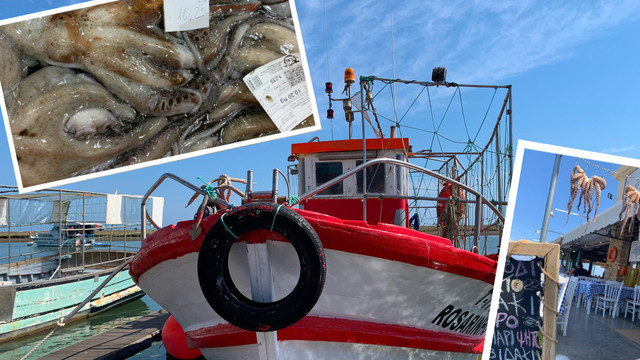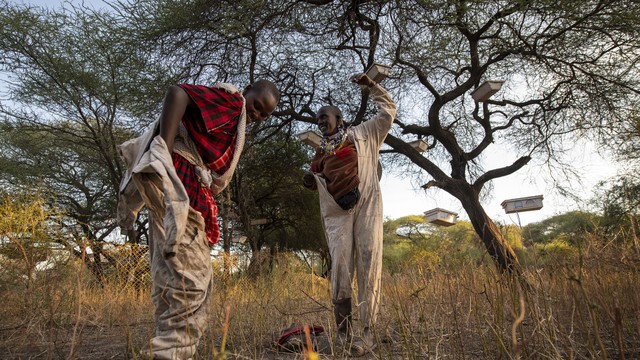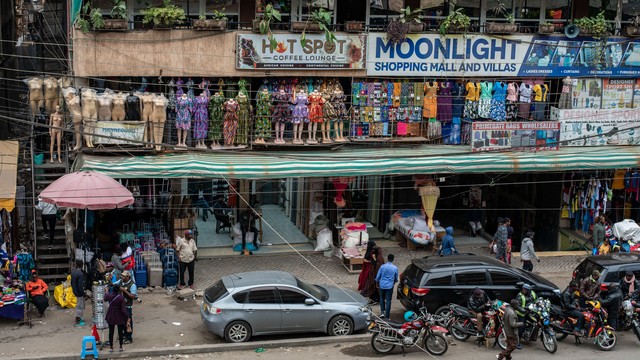Interview: Championing public participation in Kenya’s trade negotiations
International trade agreements have far-reaching impacts on rights, livelihoods and the environment. Yet there is little transparency in negotiations and few opportunities for the public to engage. Lorenzo Cotula spoke with Edgar Odari about how Econews Africa is promoting public participation in Kenya’s international trade negotiations.

 Edgar Odari (EO) is executive director of Econews Africa, a pan-African non-governmental organisation based in Kenya working to promote public participation on regional and international trade issues. Most recently, Econews has been working on Kenya’s trade negotiations with the European Union (EU), the United Kingdom (UK) and the United States (US).
Edgar Odari (EO) is executive director of Econews Africa, a pan-African non-governmental organisation based in Kenya working to promote public participation on regional and international trade issues. Most recently, Econews has been working on Kenya’s trade negotiations with the European Union (EU), the United Kingdom (UK) and the United States (US).
International trade agreements are often technical, complex and involve political choices on competing visions and interests. Who has what say – and with what results – matters a great deal. How can policy processes ensure that affected groups are listened to?
Asking the questions is Lorenzo Cotula (LC), who leads IIED’s work on international trade agreements and international investment law.
LC: Why did Econews Africa decide to work on international trade agreements?
EO: Trade agreements can have major impacts on local economies. In the agricultural sector, for example, trade liberalisation can facilitate imports that directly compete with small-scale farmers’ efforts to supply the national market. Yet there is little transparency in trade negotiations and few opportunities for the public to influence decision-making.
The lack of public participation leads to agreements that do not adequately consider their impacts on marginalised groups and are ultimately detrimental to the country’s interests.
LC: Why the particular concern about Kenya’s trade agreements or negotiations with the EU, the UK and the US?
EO: Kenya’s Economic Partnership Agreements (EPAs) with the EU and the UK and its proposed trade deal with the US all involve relations with economies in the global North. Kenya is also involved in regional processes, including in the East African community and the African Continental Free Trade Agreement.
These regional agreements aim to deepen integration between neighbouring countries and across the continent. But in North-South relations, trade agreements are often lopsided because of major power asymmetries.
For example, the US economy is hundreds of times bigger than the Kenyan economy. The two countries are formally equal, but it does not feel that way in the negotiations and the outcomes are likely to be disadvantageous for Kenya.
LC: As a civil society organisation, what is Econews Africa doing?
EO: We use several approaches. One involves engaging with government to inform Kenya’s trade policy. We also collaborate with parliament on scrutinising the deals.
We are currently working with the Parliamentary Caucus on Economy and Business which is a bipartisan group of about 30 legislators, and have submitted evidence to the Parliamentary Committee on Trade, Industry and Cooperatives.
In addition, we work with interest groups to support their advocacy and put pressure on the government and legislators. For example, we work with the Kenyan Small Scale Farmers Forum and the Eastern African Farmers Federation, both of which represent the concerns of small-scale farmers. Where necessary, we initiate public interest litigation. We have done this in relation to the UK-Kenya EPA.

Small-scale farmers harvest their crops near Kisumu, Kenya (Photo: Peter Kapuscinski/World Bank, via Flickr, CC BY-NC-ND 2.0)
LC: What does the litigation involve?
EO: We are asking the judiciary to review public participation in the treaty-making process. The Kenyan Constitution makes public participation one of its key “national values and principles of governance” (Article 10). This means there should be public participation when new legislation is proposed. The principle should apply to trade agreements as well, but we think it was not adequately followed in the case of the UK-Kenya EPA.
At first, the government only published the agreement but not all of the annexes containing the specific liberalisation commitments. In trade deals, the devil is often in the detail so these annexes are very important. The government only released the annexes after advocacy efforts from civil society including Econews Africa and pressure from the Economic Caucus group to avail the annexes.
However, merely posting complex, voluminous documents online does not enable the public to make sense of what has been negotiated. For example, many farmers cannot easily access the internet and may not speak English. If you are genuinely seeking public inputs, you need to ensure the public is in a position to contribute.
LC: How do these different strategies work together? I wonder, for example, whether you have experienced any tensions between engagement and litigation?
EO: We see the strategies as complementary and calibrate them depending on the context. Engaging with the government can be frustrating because they will tell you that they have listened to you, that they have conducted public consultations, and that they even have records of you participating in the process. But then they do not necessarily consider your views.
That is why engaging with parliament is so important. We are currently advocating for a stronger role of parliament in treaty ratification, by pushing for an amendment to the Treaty Making and Ratification Act (PDF).
Our aim is to promote greater openness and public participation because parliamentarians can seek inputs from diverse interest groups when reviewing trade deals. Litigation is the last resort if such engagements does not yield results.
LC: What tips would you share with other civil society organisations working to promote public participation in trade policy or alternative visions of trade policy?
EO: Talking to government is very important, because they play a central role in trade policy. Protests can put much-needed pressure on policymakers but ultimately you also need to propose solutions and get the government and legislators on board.
We want to help policymakers to understand issues from our point of view – and that of the stakeholders we work with – and then move with them in that direction.
Even if the government does not take up your proposals, they can still respect the fact that you have a legitimate view that is different from what they are proposing.
This matters, if you consider engagement as a long-term process rather than a one-off event: when the next policy decision comes up, the government will know the views and interests you represent and may seek your perspective.


